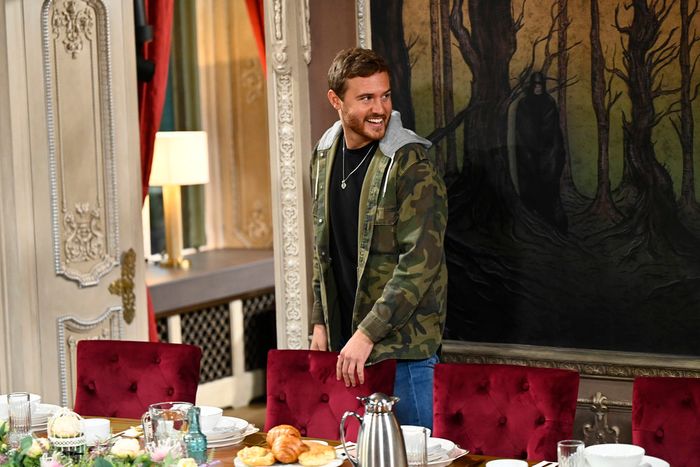
In The Traitors, prior reality-competition experience gives you an undeniable leg up; after all, season-one winner Cirie Fields honed her subtle manipulation skills over four seasons of Survivor. Yet some of the most impressive gameplay in season two has come from the underestimated non-gamers — especially Real Housewives of Atlanta’s Phaedra Parks, who played an impressive under-the-radar game while delivering television gold, and The Bachelor’s Peter Weber, who invented a new way of sniffing out Traitors with a clever shield trap. Parks and Weber eventually went head-to-head at an explosive roundtable climaxing in Parks making it personal by uttering one of the most-quoted lines of the season: “This is not The Bachelor, and I don’t have to kiss your ass for a rose.” It wasn’t her final win of the night: Their battle resolved in the penultimate episode with the banishment of Weber (though Parks followed the next evening). Whether you consider him an unlikely hero or holier-than-thou villain, Weber’s savvy gameplay has made him one of the most-discussed players in season two, cementing his main-character role as the leader of the “Peter Pals” — or the self-righteous “most Faithful of the Faithful,” depending on whom you ask.
You’ve spoken about how you always wanted to do a fun competition show, which attracted you to The Traitors. Did you go into it hoping to get anything out of it in particular, either personally or in terms of showing viewers a new side of yourself?
Honestly, I didn’t go in with the intention, but that definitely happened: People feel like they saw a different side of me. I’m a yes man. I’m all about living life to the fullest and experiencing as much as I can in this beautiful life: “This is the next adventure. Let’s do it.” I love pushing myself. I love making myself uncomfortable. That’s so good for growth.
On the show, you mentioned The Traitors being a lot easier than The Bachelor. The nature of filming those two shows is very different, but do you see any connection between how you approached them?
No, very different approaches. On The Bachelor, I was so focused on people-pleasing, on making everyone feel welcome and included and loved. I gave so much of myself that ultimately, it wore me down. The tank runs dry. On The Traitors, I actually did the opposite of that: closing doors and trying to have private conversations. I was a lot more focused on my group getting as far as possible. I wasn’t ever trying to ostracize people, but I was much more invested in being strategic and smart.
Throughout your time on the show, you really bring a sense of morality into the game — talking about how to play “the right way.” But the game is designed to make players lie and manipulate, even the Faithfuls, and you pulled off a lot of trickery yourself. Is there really a “right” way to play, morally speaking?
That got totally taken out of context. I did say that, but I meant that it becomes a pride aspect. I didn’t want to turn, because I felt like we had so much momentum and success as Faithfuls. It was almost more of a challenge: “I want to win this way.” That could be ridiculous, and people might take it the wrong way, but I’m just being honest: If we can win as Faithfuls, that would be freaking awesome. It would be fun to win as a Traitor, but it’s a lot harder as a Faithful. The level of satisfaction of being able to get to the end would’ve been much higher, at least for me. But of course there’s no right or wrong way to win the game. No one’s actually a Traitor, no one’s a bad person, no one’s killing anyone.
The game also encourages you, as a Faithful, to really believe you’re the good guy, just like it encourages Traitors to get into that “evil” role.
That kind of “us versus them” mentality does arise. That goes all the way to Alan Cumming, who is incredible in his role. He’s such a Method actor. He never broke character. You truly feel like you’re at this guy’s insane castle in the middle of Scotland and somebody is actually going to get murdered tonight.
Is there anything you wish the edit included that we didn’t get to see?
There were a couple gameplay things. I had actually shared all the information from the recruitment letter with everyone in the castle days later. I used that as a strategic way to try to gain some trust with them and a peace offering for having ostracized them in the beginning.
They never showed me calling out Phaedra as a Traitor at the roundtable after Dan left and getting that going. Or the “bloodhound” comment Phaedra made after Parvati used the same word, kind of a Freudian slip. Some of the evidence I had come up with and shared didn’t make it to the screen. Some people were like, “There really was no evidence,” but there was.
You’re used to watching yourself back on TV in these very emotionally intense, intimate situations. How does this show compare to The Bachelor in that way?
My experience on The Bachelor, having a lot of heartbreak with that — The Traitors wasn’t the same kind of heartbreak, but watching back my banishment at the end, it brought similar feelings. It was emotional for me. I was curious how the banishment would come across onscreen because I was legitimately holding back so much emotion, and I poured everything I had into the game. To have your peers vote you out, that hurt. It was tough to watch.
Would you say you’ve handled negative feedback from viewers similarly?
You put yourself into a reality-TV environment and you’re going to get everything under the sun. In the beginning, you’re not used to it and it can take a toll. But having some experience now, no one gets good without the bad or bad without the good. If you do, you’re probably a really boring person. It’s almost a compliment to have so much discussion surrounding you.
This interview has been edited and condensed for clarity.
More From The Traitors
- The Traitors Recap: Heads Will Roll
- I Regret to Inform You That Sandoval Steals Every Scene in The Traitors
- How Boston Rob Became The Traitors’ Biggest Threat


